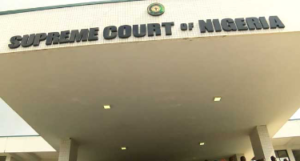The Federal High Court in Lagos has issued a final forfeiture order for five prime properties linked to Major-General Umaru Mohammed, a former Managing Director of Nigerian Army Properties Limited (NAPL), to the Federal Government. The order, delivered by Justice Chukujekwu Aneke on Wednesday, followed a motion by A.O. Mohammed, the lawyer representing the Economic and Financial Crimes Commission (EFCC).
The EFCC had presented evidence to the court indicating that the properties were acquired through fraudulent means, with the proceeds from their sale being diverted for Major-General Mohammed’s personal use. In the motion for final forfeiture, the EFCC’s counsel emphasized that the commission had adhered to the court’s previous directive to publish the interim forfeiture order, allowing any interested parties to come forward and contest the forfeiture.
“It will be in the interest of justice for the court to grant the prayers being sought and also order the final forfeiture of the properties to the Federal Government,” argued Mohammed, underscoring the gravity of the case and the necessity of the forfeiture to uphold justice.
Justice Aneke, after considering the submissions made by the EFCC’s counsel, ordered the final forfeiture of the properties to the Federal Government. The properties in question are located in some of Lagos’ most prestigious areas: No. 8b Bedwell Road, Ikoyi; No. 3 Force Road, Ikoyi; No. 14 Glover Road, Ikoyi; No. 6 Marina, Ikoyi; and No. 28 Point Road, Apapa.
The journey to this final forfeiture began on March 4, 2024, when Justice Aneke ordered the interim forfeiture of these properties. The court’s order was based on the EFCC’s presentation that the properties were reasonably suspected to be proceeds of unlawful activities. The judge also mandated that the interim forfeiture order be published in a newspaper, providing an opportunity for any interested parties to show cause why the properties should not be permanently forfeited to the Federal Government.
 The absence of any credible challenges to the forfeiture paved the way for the final order. This case highlights the ongoing efforts by the EFCC to combat corruption and recover assets acquired through illicit means. The forfeiture of these properties represents a significant victory in the fight against corruption, demonstrating the judiciary’s commitment to upholding the rule of law and ensuring that public resources are not misappropriated for personal gain.
The absence of any credible challenges to the forfeiture paved the way for the final order. This case highlights the ongoing efforts by the EFCC to combat corruption and recover assets acquired through illicit means. The forfeiture of these properties represents a significant victory in the fight against corruption, demonstrating the judiciary’s commitment to upholding the rule of law and ensuring that public resources are not misappropriated for personal gain.
Major-General Mohammed’s case is a stark reminder of the stringent measures in place to detect and prosecute financial crimes within Nigeria’s public sector. The EFCC’s diligence in investigating and pursuing the forfeiture of these properties underscores the agency’s resolve to address corruption at all levels.
The properties now forfeited to the Federal Government are valuable assets that can potentially be repurposed for public use, contributing to national development. This outcome serves as a deterrent to others in positions of authority who might consider misappropriating public resources for personal enrichment.
In conclusion, the final forfeiture of the properties linked to Major-General Umaru Mohammed marks a notable achievement in Nigeria’s anti-corruption efforts. The Federal High Court’s decision, following thorough investigations and legal proceedings, reinforces the message that fraudulent activities and the misappropriation of public funds will not be tolerated. As these assets are reclaimed by the government, they serve as a testament to the ongoing pursuit of transparency, accountability, and justice within the nation’s public institutions.




